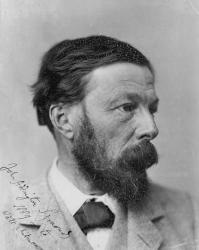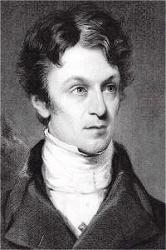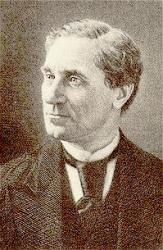1833 - 1899 Person Name: William Tidd Matson, 1833-1906 Author of "Lord, I was blind; I could not see" in The Sanctuary Hymnal, published by Order of the General Conference of the United Brethren in Christ Matson, William Tidd, was born at West Hackney, London, Oct. 17, 1833. He was educated first under the Rev. J. M. Gould, and then at St. John's College, Cambridge. Subsequently he studied under Professor Nesbitt, at the Agricultural and Chemical College, Kennington. In 1853 he underwent a great spiritual change. Leaving the Church of England, he first joined the Methodist New Connexion body, and then the Congregationalists. After the usual theological training, he entered the ministry, and held several pastorates, including Havant, Hants; Gosport; Highbury; Portsmouth, and others. His poetical works include:—
(1) A Summer Evening Reverie, and Other Poems, 1857; (2) Poems, 1858; (3) Pleasures of the Sanctuary, 1865; (4) The Inner Life, 1866; (5) Sacred Lyrics, 1870; (6) Three Supplemental Hymns, &c, 1872; (7) The World Redeemed, 1881, &c.
Several of Matson's hymns have been given in Allon's Supplemental Hymns; Horder's Congregational Hymns; The Baptist Hymnal; Dale's English Hymn Book.; Barrett's Congregational Church Hymnal, 1887, and others. The best known are:—
1. Father, of all, Whose wondrous power. Prayer to the Holy Trinity.
2. Glory, glory to God in the highest. Christmas.
3. God is in His temple. Divine Worship.
4. I'm but a little child. A Child's Prayer.
5. In whom shall I find comfort? God, the Source of Comfort.
6. Lord, I was blind, I could not see. Christ, the Life of Men.
7. O blessed Life, the heart at rest. Christ the Life of Men.
8. Teach me, O Lord, Thy holy way. Divine Guidance desired.
Mr Matson's hymns show a considerable mastery of the forms of hymnic expression, but are somewhat lacking in lyric energy. Those written for use with German chorales are excellent efforts, and rank with his best work. Taken as a whole his hymns are far above the average, and deserve wide acknowledgment. [Rev. W. Garrett Horder]
--John Julian, Dictionary of Hymnology (1907)
================
Matson, W. T, p. 719, ii. His "Glory to God in the highest, Shall be our song to-day" (Christmas) is in the Scottish Hymnal, 1884.
--John Julian, Dictionary of Hymnology, Appendix, Part II (1907)
=================
Matson, W. T. , p. 719, ii. He died in 1899. The hymn, "Glory to God in the highest, shall be our song to-day," p. 1591, i., is given to Mr. Matson in error. It is found in W. B. Bradbury's Golden Censer, 1864, p. 116, without authorship, and again in P. Phillips's Singing Pilgrim, 1866, p. 79, as by Mrs. E. H. Gates. [Rev. James Mearns, M.A.]
--John Julian, Dictionary of Hymnology, New Supplement (1907)
William Tidd Matson


 My Starred Hymns
My Starred Hymns






